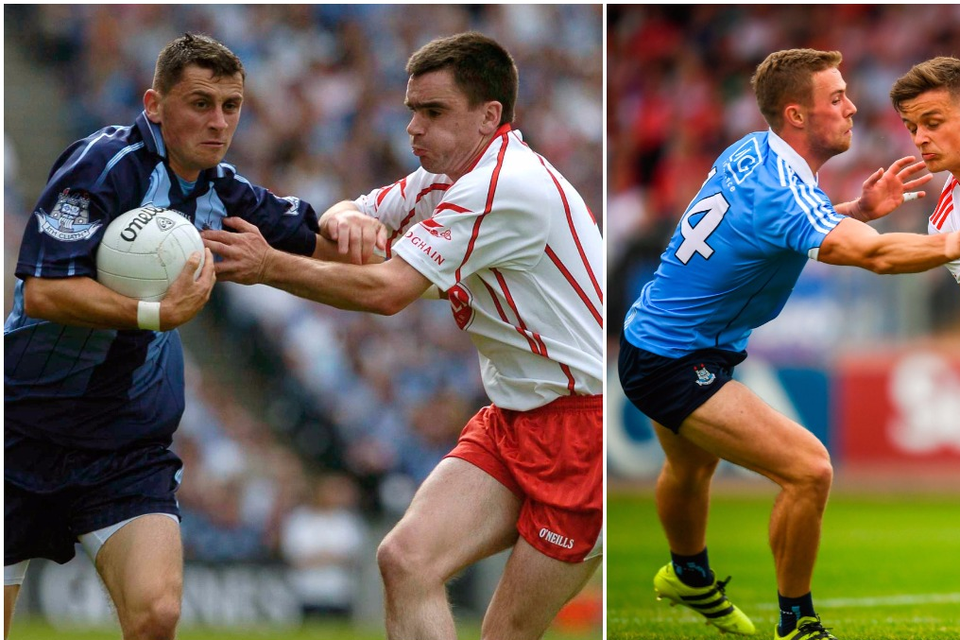Alan Brogan: In 2005, Dublin and Tyrone tried to score with every play - in 2018, it has become a different sport
Alan Brogan (left) in action against Tyrone in 2005, which was a very different encounter to the game the teams played in Omagh this year (right).
THERE’S footage on YouTube of our All-Ireland quarter-final with Tyrone in 2005 that for some reason, I found myself watching the other day.
Granted, that was 13 years ago, a different time, but watching it back now was a bit like watching a different sport altogether.
What a game!
We were five up at one stage but the momentum of that match swung manically back and forth until the end.
We had a go. They had a go back.
They brought us to a replay that wasn’t quite as enthralling as the draw but the levels of excitement and unpredictability made them classics by comparison to what we watch every Sunday now.
Both teams tried to score with every play.
And both teams operated with the mindset that the best way to win was to run up as big a score as quickly as possible.
That might sound blindingly obvious but the feel of football matches now is totally different from what it was then.
Momentum doesn’t really exist in inter-county football any more.
Nobody has momentum. Just possession.
In 2005, both ourselves and Tyrone put kickouts long into midfield because the reward for catching it was a launchpad for an attack from the middle of the pitch.
Nowadays, teams take short kickouts whenever possible, because the risk of kicking the ball into midfield is being turned over and loss of possession.
In 2005, both ourselves and Tyrone kicked long, direct ball into our full-forward line because the prize for winning it was a scoring chance close to the opposition goal.
Nowadays, teams cradle possession endlessly, avoid contact and run from deep, because the potential peril with kicking it in long is conceding possession.
The mindset has changed.
And things that happened in that game helped lead to change.
In the first half of the drawn duel, Ciarán Whelan destroyed Tyrone in the air. In the second, he had two men jumping with him for every kickout and two waiting to cage him in when he landed.
Sweepers and zonal defences have made kicking long, quick ball into your full-forward line foolish and irresponsible.
So the risk/reward emphasis has been radically altered. Everything is about possession and control now.
Players no longer play off their instincts.
Instead, they run plays they’ve done a million times before in training.
And let’s be honest about this, it doesn’t make for much entertainment.
We’ve also reached a point in the game’s evolution where one team are discernibly better at playing this way than everybody else, so everyone is expecting them to win the All-Ireland.
And not only now, as Jim Gavin’s Dubs sit on the verge of a fourth title in-a-row, but ever since they won their third.
And then we wonder why attendances in Croke Park were so poor last weekend.
True, we’ve had a few moments this season; Carlow and Fermanagh rising, Kerry and Mayo falling.
But the prevalent tactical thinking isn’t conducive to excitement.
Now, I’m not pining for the old days.
I’m fully aware that there were plenty of championships in the eighties, nineties and noughties where the number of bad games far outnumbered the good.
And despite what some make out, the level of skill - as well as fitness and organisation - has never been even nearly as high as it is now.
But the pattern of matches back then – in all its innocence – at least allowed for the possibility of drama.
Imagine Dublin or Tyrone were five points up in the All-Ireland final in just over two weeks’ time?
Players are programmed differently, too.
Instead of wanting to be the guy that kicks the killer pass that sets up a goal, fellas are motivated now not to be the guy who has a number in the ‘turnovers’ column beside his name. There was much made of Paul Mannion and Con O’Callaghan not scoring in the ‘Super 8s’ but it can be tough being an inside forward these days.
You might be screaming for the ball but that O’Neill’s Size 5’s primary mode of transport is a runner from defence.
Your job is to loop around the back of him when he carries it into the scoring zone.
It’s a different game.
Tyrone’s forwards suffer the same affliction.
For years now, we’ve heard they don’t possess the inside forwards to win an All-Ireland.
But Peter Canavan himself could be standing in the corner for this team and not get much of an opportunity.
When you consider Tyrone’s most dangerous players, you don’t think of Mark Bradley, Lee Brennan or Connor McAliskey, fellas who play ahead of the ball.
You think: Mattie Donnelly, Peter Harte, Niall Sludden, even Tiernan McCann, the guys who carry it in.
That’s partly because they’re very good and partly because Tyrone’s system allows them to be.
And though they’ll hardly appreciate being lumped with this responsibility, it’s up to Tyrone now to save this season.
If they go in and play against Dublin like they did last summer, they’ll be taken apart again.
And for everyone outside the capital, the football year will be considered a dud. It might even prompt an examination of the playing rules to somehow force teams to be less measured or cautious.
If Tyrone come to Croke Park and are brave, we could at least have a decent final.
That game rhythm we seem to be stuck in; short kick-out, slow build-up, runners off-the-shoulder – Dublin will beat you all day long at that.
Tyrone have become more expansive in the last year. Certainly in the first half against Monaghan last Sunday, they only had one extra man at the back, Colm Cavanagh.
Mostly, Dublin play the same way and that gives the opportunity to both teams to kick ball into their forwards if they were so inclined.
And they should be.
Tyrone only got 1-13 against Monaghan, a much lesser team than Dublin, and even if they were to match that on September 2, it won’t be nearly enough to win or go close.
Regardless of how Tyrone defend, Dublin will score at least 20 points against them so the emphasis over the next couple of weeks should be finding and practising a way to repeatedly penetrate Dublin’s defence.
Naturally, Tyrone will be emboldened by the fact that they kept things so tight against Dublin in Omagh last month but Croke Park in an All-Ireland SFC final is a different story altogether.
We need to see something different and his track record shows Mickey Harte has never been afraid to try something different in All-Ireland deciders.
Take Canavan’s on/off/on again substitution in 2003.
Or bringing back Stephen O’Neill on the eve of the 2008 final – examples of creative thinking from one of modern football’s great managers.
And unless he goes off-script on September 2, this year’s final will descend into the formality everyone expects.















